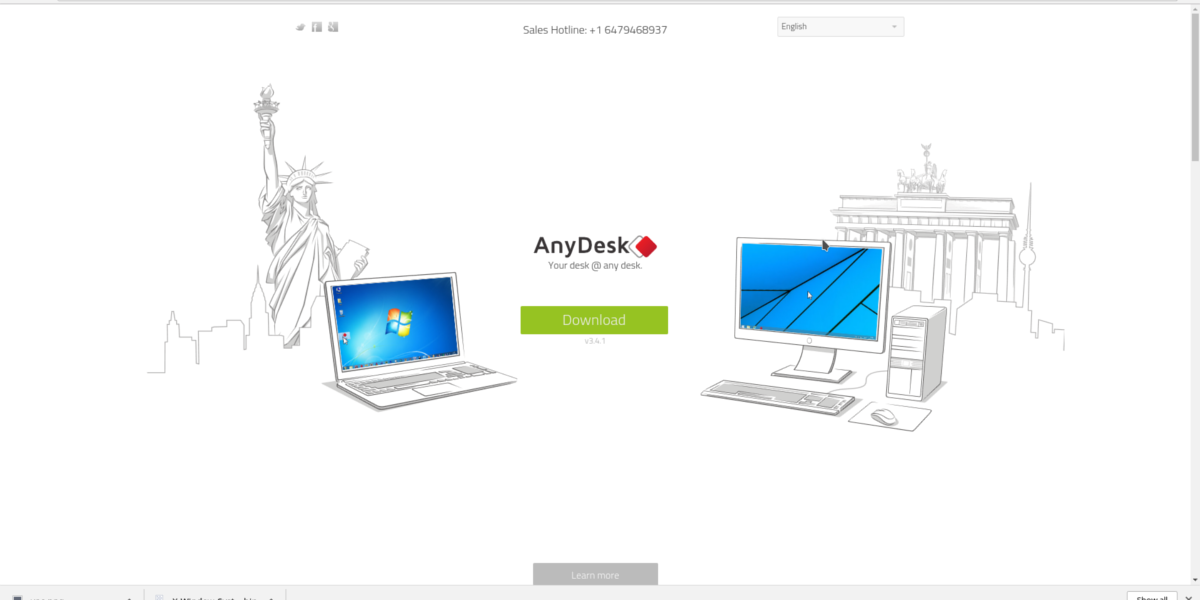Anydesk: Linux install instructions [Guide]
Anydesk is a remote desktop application for Linux, Windows, Mac, and other platforms. It claims to be the fastest and easiest to use compared to other remote applications on the market. Here’s how to install it on Linux.
Anydesk Linux installation – Ubuntu
On Ubuntu, the Anydesk app is installed by downloading a DEB package from the official website. To start the installation, open up a terminal window. You can open up a terminal window on Ubuntu by pressing Ctrl + Alt + T or by searching for “Terminal” in the app menu.
Once the terminal window is open and ready to go, execute the following wget download command to download the latest Anydesk DEB package for Ubuntu.
Note: Don’t want to use the wget download command to grab the latest Anydesk package? Head over to the AnyDesk official download page and grab it there.
wget https://download.anydesk.com/linux/anydesk_6.0.1-1_amd64.deb -O ~/Downloads/anydesk_6.0.1-1_amd64.deb
After downloading the latest Ubuntu DEB package for Anydesk on your Linux PC, the installation can begin. Using the CD command, access the “Downloads” directory on your Linux PC.
cd ~/Downloads
Inside of the “Downloads” folder, use the following Apt installation command to get Anydesk set up on your Ubuntu PC.
sudo apt install ./anydesk_6.0.1-1_amd64.deb
Anydesk Linux installation – Debian
To install Anydesk on Debian Linux, you will need to download the DEB package from the official website. To start the download, launch a terminal window. You can launch a terminal window on Debian Linux by pressing Ctrl + Alt + T or by searching for “Terminal” in the app menu.
With the terminal window open, use the following wget download command to grab the latest Anydesk DEB package for your Debian Linux PC.
Note: Not interested in using the wget download command to get the latest Anydesk package? Head over to the AnyDesk official download page instead.
wget https://download.anydesk.com/linux/anydesk_6.0.1-1_amd64.deb -O ~/Downloads/anydesk_6.0.1-1_amd64.deb
After downloading the Anydesk DEB package to your Debian Linux PC, start the installation by using the CD command to move into the “Downloads” directory.
cd ~/Downloads/
Once inside the “Downloads” directory, use the dpkg command to install the Anydesk DEB package on your Debian Linux PC.
sudo dpkg -i anydesk_6.0.1-1_amd64.deb
After installing the package on Debian, you will need to correct any dependency issues that may have arisen by using the apt-get install -f command.
sudo apt-get install -f
Anydesk Linux installation – Arch Linux

Anydesk is available for Arch Linux users. However, there are no download instructions on the Anydesk website. Instead, Arch Linux users will need to rely on the Arch Linux AUR.
To start the installation, you will need to install the Trizen AUR helper. Install Trizen with the commands below.
sudo pacman -S git base-devel git clone https://github.com/trizen/trizen cd trizen makepkg -sri
After installing the Trizen AUR helper, you will be able to install Anydesk on Arch Linux with the following command.
trizen -S anydesk-bin
Anydesk Linux installation – Fedora
To install Anydesk on Fedora Linux, you will need to download the Anydesk RPM file from the official website. To start the download, open up a terminal window on the Fedora desktop. To open up a terminal window, press Ctrl + Alt + T or search for “terminal” in the app menu.
With the terminal window open and ready to go, make use of the wget command below to download the latest Anydesk RPM package for Fedora Linux.
Note: Don’t feel like using the wget download command to get the latest Anydesk package? Go to the AnyDesk official download page instead.
wget https://download.anydesk.com/linux/anydesk_6.0.1-1_x86_64.rpm -O ~/Downloads/anydesk_6.0.1-1_x86_64.rpm
When the Anydesk RPM package is done downloading to your Fedora Linux PC, the installation can begin. Using the CD command, move the terminal window into the “Downloads” directory.
cd ~/Downloads
Inside of the “Downloads” directory, make use of the dnf install command to load up the Anydesk RPM package to your computer.
sudo dnf install anydesk_6.0.1-1_x86_64.rpm
Anydesk Linux installation – OpenSUSE
OpenSUSE Linux has support for Anydesk thanks to the downloadable RPM package from the Anydesk website. To get Anydesk working on your OpenSUSE Linux PC, start by opening up a terminal window on the OpenSUSE desktop.
To open up a terminal window on the OpenSUSE Linux desktop, press Ctrl + Alt + T on the keyboard. Alternatively, search through your app menu for the “Terminal” app and launch it that way.
Once the terminal window is open and ready to go, make use of the wget command below to download the latest OpenSUSE Anydesk RPM package to your PC.
Note: Not interested in using the wget download command to get the latest Anydesk package? Head over to the AnyDesk official download page instead.
wget https://download.anydesk.com/linux/anydesk_6.0.1-1_x86_64.rpm -O ~/Downloads/anydesk_6.0.1-1_x86_64.rpm
After downloading the latest RPM package file to your OpenSUSE Linux PC, the installation can begin. Using the CD command, move into the “Downloads” directory.
cd ~/Downloads
From here, install the Anydesk RPM package on OpenSUSE with the zypper install command.
sudo zypper install anydesk_6.0.1-1_x86_64.rpm
Anydesk Linux installation – Flatpak
Anydesk is available as a Flatpak package on Flathub. To start the installation, you must have the latest Flatpak runtime configured on your Linux PC. To do that, follow this guide on the subject.
Once you’ve set up the Flatpak runtime on your computer, you’ll be able to install Anydesk on your Linux system with the two commands below.
flatpak remote-add --if-not-exists flathub https://flathub.org/repo/flathub.flatpakrepo flatpak install flathub com.anydesk.Anydesk
